Related Research Articles

In probability theory and statistics, the binomial distribution with parameters n and p is the discrete probability distribution of the number of successes in a sequence of n independent experiments, each asking a yes–no question, and each with its own Boolean-valued outcome: success or failure. A single success/failure experiment is also called a Bernoulli trial or Bernoulli experiment, and a sequence of outcomes is called a Bernoulli process; for a single trial, i.e., n = 1, the binomial distribution is a Bernoulli distribution. The binomial distribution is the basis for the popular binomial test of statistical significance.

A black hole is a region of spacetime where gravity is so strong that nothing, including light or other electromagnetic waves, has enough energy to escape it. The theory of general relativity predicts that a sufficiently compact mass can deform spacetime to form a black hole. The boundary of no escape is called the event horizon. Although it has a great effect on the fate and circumstances of an object crossing it, it has no locally detectable features according to general relativity. In many ways, a black hole acts like an ideal black body, as it reflects no light. Moreover, quantum field theory in curved spacetime predicts that event horizons emit Hawking radiation, with the same spectrum as a black body of a temperature inversely proportional to its mass. This temperature is of the order of billionths of a kelvin for stellar black holes, making it essentially impossible to observe directly.

El Niño is the warm phase of the El Niño–Southern Oscillation (ENSO) and is associated with a band of warm ocean water that develops in the central and east-central equatorial Pacific, including the area off the Pacific coast of South America. The ENSO is the cycle of warm and cold sea surface temperature (SST) of the tropical central and eastern Pacific Ocean.

Frequency is the number of occurrences of a repeating event per unit of time. It is also occasionally referred to as temporal frequency for clarity and to distinguish it from spatial frequency. Frequency is measured in hertz (Hz) which is equal to one event per second. Ordinary frequency is related to angular frequency by a scaling factor of 2π. The period is the interval of time between events, so the period is the reciprocal of the frequency.
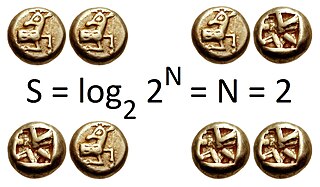
In information theory, the entropy of a random variable is the average level of "information", "surprise", or "uncertainty" inherent to the variable's possible outcomes. Given a discrete random variable , which takes values in the alphabet and is distributed according to :
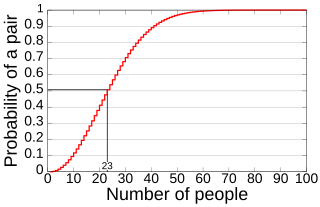
In probability theory, the birthday problem asks for the probability that, in a set of n randomly chosen people, at least two will share a birthday. The birthday paradox refers to the counterintuitive fact that only 23 people are needed for that probability to exceed 50%.
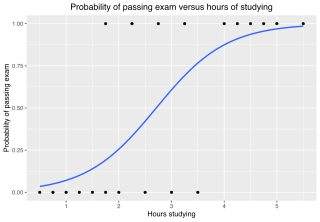
In statistics, the logistic model is a statistical model that models the probability of an event taking place by having the log-odds for the event be a linear combination of one or more independent variables. In regression analysis, logistic regression is estimating the parameters of a logistic model. Formally, in binary logistic regression there is a single binary dependent variable, coded by an indicator variable, where the two values are labeled "0" and "1", while the independent variables can each be a binary variable or a continuous variable. The corresponding probability of the value labeled "1" can vary between 0 and 1, hence the labeling; the function that converts log-odds to probability is the logistic function, hence the name. The unit of measurement for the log-odds scale is called a logit, from logistic unit, hence the alternative names. See § Background and § Definition for formal mathematics, and § Example for a worked example.
Ben Fouhy is a New Zealand flatwater and marathon canoeist who has been competing since the early 2000s. Competing in three Summer Olympics, he won the silver in the K-1 1000 m event at Athens in 2004, as well as finishing fourth in the 2008 Olympics and ninth in the 2012 Olympics in the same event. He is the recipient of the 2003 Halberg Award for NZ Sportsman of the Year and a former world record holder in the K1 1000m event.

Adam Joseph van Koeverden is a Canadian sprint kayaker and politician. He is an Olympic gold medallist in the K-1 500m category (2004) and a two-time world champion in K-1 500 (2007) and K-1 1000 (2011), winning four Olympic and eight world championship medals. His home club is the Burloak Canoe Club in Oakville, Ontario.
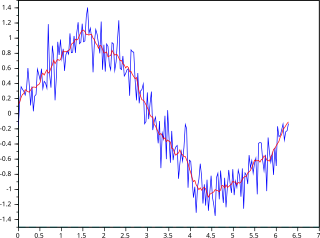
In statistics, a moving average is a calculation to analyze data points by creating a series of averages of different selections of the full data set. It is also called a moving mean (MM) or rolling mean and is a type of finite impulse response filter. Variations include: simple, cumulative, or weighted forms.

The surface gravity, g, of an astronomical object is the gravitational acceleration experienced at its surface at the equator, including the effects of rotation. The surface gravity may be thought of as the acceleration due to gravity experienced by a hypothetical test particle which is very close to the object's surface and which, in order not to disturb the system, has negligible mass. For objects where the surface is deep in the atmosphere and the radius not known, the surface gravity is given at the 1 bar pressure level in the atmosphere.
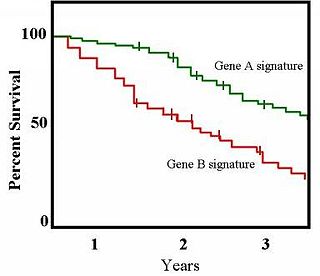
The Kaplan–Meier estimator, also known as the product limit estimator, is a non-parametric statistic used to estimate the survival function from lifetime data. In medical research, it is often used to measure the fraction of patients living for a certain amount of time after treatment. In other fields, Kaplan–Meier estimators may be used to measure the length of time people remain unemployed after a job loss, the time-to-failure of machine parts, or how long fleshy fruits remain on plants before they are removed by frugivores. The estimator is named after Edward L. Kaplan and Paul Meier, who each submitted similar manuscripts to the Journal of the American Statistical Association. The journal editor, John Tukey, convinced them to combine their work into one paper, which has been cited more than 61,800 times since its publication in 1958.
Steven Sean Ferguson is a sprint canoeist, surf lifesaver and former swimmer from New Zealand.

The 5000 metres or 5000-metre run is a common long-distance running event in track and field, approximately equivalent to 3 miles 188 yards or 16,404 feet 2 inches. It is one of the track events in the Olympic Games and the World Championships in Athletics, run over 12+1⁄2 laps of a standard track. The same distance in road running is called a 5K run; referring to the distance in metres rather than kilometres serves to disambiguate the two events. The 5000 m has been present on the Olympic programme since 1912 for men and since 1996 for women. Prior to 1996, women had competed in an Olympic 3000 metres race since 1984. The 5000 m has been held at each of the World Championships in Athletics in men's competition and since 1995 in women's.

Canoeing has been featured as competition sports in the Summer Olympic Games since the 1936 Games in Berlin, although they were demonstration sports at the 1924 Games in Paris. There are two disciplines of canoeing in Olympic competition: slalom and sprint.

The 2010 ICF Canoe Sprint World Championships were held 19–22 August 2010 in Poznań, Poland, on Lake Malta. This was the third time that the Polish city hosted the championships, having done so previously in 1990 and 2001. Paracanoe and the women's C-1 200 m events that were exhibition events at the previous world championships in Dartmouth, Nova Scotia, Canada, became official events at these championships.
The Paleocene, or Palaeocene, is a geological epoch that lasted from about 66 to 56 million years ago (mya). It is the first epoch of the Paleogene Period in the modern Cenozoic Era. The name is a combination of the Ancient Greek παλαιός palaiós meaning "old" and the Eocene Epoch, translating to "the old part of the Eocene".

In probability theory and statistics, the Poisson distribution is a discrete probability distribution that expresses the probability of a given number of events occurring in a fixed interval of time or space if these events occur with a known constant mean rate and independently of the time since the last event. It is named after French mathematician Siméon Denis Poisson. The Poisson distribution can also be used for the number of events in other specified interval types such as distance, area, or volume.

The Cretaceous–Paleogene (K–Pg) extinction event, also known as the Cretaceous–Tertiary(K–T)extinction, was a sudden mass extinction of three-quarters of the plant and animal species on Earth, approximately 66 million years ago. The event caused the extinction of all non-avian dinosaurs. Most other tetrapods weighing more than 25 kilograms also became extinct, with the exception of some ectothermic species such as sea turtles and crocodilians. It marked the end of the Cretaceous Period, and with it the Mesozoic era, while heralding the beginning of the Cenozoic era, which continues to this day.
This article details the canoeing at the 2020 Summer Olympics qualifying phase. The 2020 Olympics were postponed to 2021 due to the COVID-19 pandemic. Similar to 2012 and 2016 format, a qualification system has been set up for both slalom and sprint canoeing at these games. The quotas have already been set for each event by the International Canoe Federation in October 2018.